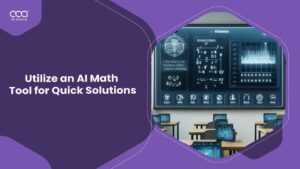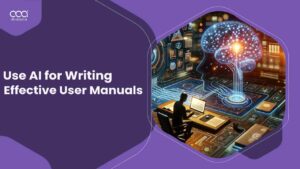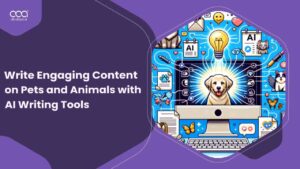The integration of Artificial Intelligence (AI) into various fields has been transformative, and academic research is no exception. AI writing tools are increasingly becoming essential for researchers, offering a range of functionalities from data collection to enhancing writing quality.
This article will teach you how to integrate AI writing tools into academic research in France, discussing how to use AI in every step of the process, as well as best practices to ensure quality and compliance with ethical guidelines.
How to Integrate AI Writing Tools into Academic Research in France for 2024?
The integration of the best AI writing tools into academic research is a burgeoning field that promises to revolutionize the way academic content is developed, analyzed, and refined. These tools, powered by advanced algorithms and machine learning, can assist researchers in various aspects of their work.

Below, we explore the key areas where AI tools can be integrated into academic research and the steps to effectively implement them.
Finding and Reviewing Relevant Papers
One of the most time-consuming aspects of academic research is locating and reviewing relevant literature.
AI writing tools can significantly expedite this process. These tools use algorithms to search through extensive databases of academic papers, identifying those that are most relevant to the researcher’s area of study.
Once relevant papers are identified, AI tools can also assist in summarizing the key points, making the initial review process more efficient and less daunting.
Implementation: Researchers can use AI-based literature review tools to input their research topics and receive a curated list of relevant papers. Additionally, utilizing AI tools that provide summaries or highlight key findings can further streamline the literature review process.
Comprehending Academic Papers
Understanding complex academic papers, especially those outside one’s immediate field of expertise, can be challenging.
AI tools can assist by breaking down complex concepts into simpler terms, providing contextual explanations, and even translating content into different languages.
This feature is particularly beneficial for interdisciplinary research where a comprehensive understanding across different fields is necessary.
Implementation: Researchers should seek AI tools that offer explanatory features, contextual translations, and concept simplification to aid in comprehending complex academic materials.
Data Collection and Analysis
AI tools are incredibly efficient at collecting and analyzing large volumes of data. They can automate the process of data collection, especially from digital sources, and assist in the analysis of this data.
This includes identifying trends, patterns, and correlations that might not be immediately apparent. This function is particularly useful in fields where big data plays a crucial role, such as in social sciences or bioinformatics.
Implementation: Integrating AI tools that specialize in data scraping, pattern recognition, and statistical analysis can vastly improve the efficiency and accuracy of data collection and analysis phases of research.
Enhancing Academic Writing Quality
AI writing tools are not just about generating content; they are also incredibly useful in improving the quality of academic writing.
These tools can suggest better word choices, ensure grammatical accuracy, and maintain the formal tone required in academic writing.
They can also help organize thoughts and structure arguments more coherently, which is crucial in academic writing.
Implementation: Utilizing artificial intelligence tools for grammar checking, style enhancement, and structural organization can help in refining the quality of academic writing.
Facilitating Team Collaborations
Research often involves collaboration with other academics, which can be challenging, especially in coordinating efforts and maintaining consistency.
AI tools offer solutions for seamless collaboration, such as document sharing, real-time editing, and version control. These tools ensure that team members are on the same page and can work together efficiently, regardless of their physical location.
Implementation: Implement collaborative AI tools that offer features like shared workspaces, document synchronization, and version tracking to enhance teamwork in research projects.
Instant Plagiarism Checking
Maintaining originality in academic writing is crucial. AI tools can instantly scan documents for plagiarism, comparing them against a vast database of academic work.
This ensures that the research is original and helps in citing sources accurately, which is a critical aspect of academic integrity.
Implementation: Regular use of AI-powered plagiarism checking tools should be a standard practice to ensure the originality and integrity of academic work.
What is Academic Writing?
Understanding how to integrate AI writing tools into academic research in France can enhance the clarity, conciseness, and structure of academic writing, making it an invaluable asset for universities and scholarly publications.

Academic writing is evidence-based, requiring citations of sources and adherence to specific formatting guidelines.
As we explore the integration of AI into academic environments, it’s crucial to consider its broader implications across educational sectors. Discover more about AI’s potential roles in our detailed exploration in the blog Will AI Replace Or Assist Teachers?.
Best Practices While Using AI for Academic Research
The use of AI in academic research has opened up new avenues for innovation and efficiency. However, to leverage these tools effectively and ethically, it is essential to follow certain best practices.

These practices ensure that the research remains credible, ethical, and of high quality.
Ensuring Data Quality and Addressing Bias
One of the fundamental concerns in using AI for academic research, particularly when exploring how to integrate AI writing tools into academic research in France, is the quality of data and algorithmic bias. Ensuring the use of high-quality, diverse, and representative data sets is crucial to avoid biases that could skew research outcomes, as AI systems’ effectiveness is directly tied to the training data they receive.
Researchers should critically evaluate their data sources for completeness, accuracy, and potential biases. It is also recommended to use a variety of data sources to ensure a comprehensive and unbiased approach.
Adhering to Academic Ethics
AI tools should be used to augment the research process, not replace it. Researchers must ensure that they use AI tools in a manner that adheres to the ethical standards of academic research. This includes maintaining the integrity of research data, ensuring proper attribution of AI-assisted work, and avoiding any form of academic dishonesty.
Researchers should be transparent about the extent to which AI tools are used in their research. Proper citation of sources and the acknowledgment of AI assistance in research are key to maintaining ethical standards.
Checking for AI ‘Hallucinations’
AI, particularly in language processing, can sometimes generate information that appears plausible but is factually incorrect or ‘hallucinated.’ It is essential for researchers to verify the information generated by AI tools through cross-checking with reliable sources.
Critical review and validation of AI-generated content against established research or data is crucial. Researchers should not rely solely on AI for factual information and should always cross-reference AI findings with credible sources.
Maintaining Human Oversight
While AI tools, including those focused on how to integrate AI writing tools into academic research in France, can automate and streamline many aspects of the academic process, the indispensable role of human oversight cannot be overstated. The expertise and critical judgment of researchers are crucial in the final analysis and interpretation of data, ensuring that the integration of AI enhances rather than diminishes the quality of academic work.
Regular review and interpretation of AI-generated data and content by the researcher are essential. Researchers should not solely depend on AI for decision-making but use it as a tool to aid their scholarly judgment.
FAQs
Can I Use AI to Write a Research Paper?
How Can AI Be Used for Academic Research?
What is the AI Writer for Academic Research?
Can Turnitin Detect AI Writing?
Conclusion
The integration of AI writing tools in academic research offers numerous benefits, including efficiency, enhanced quality, and effective collaboration. However, it’s imperative to use these tools ethically, maintain human oversight, and be aware of their limitations.
Knowing how to integrate AI writing tools into academic research in France can enhance your research papers, ensuring you comprehensively cover every aspect. To learn more about other tools you can use to generate content, check out the articles we have in our How To series. If you’re curious about the wider world of AI and want to explore further, read through the articles in our AI Definitions Guide.





